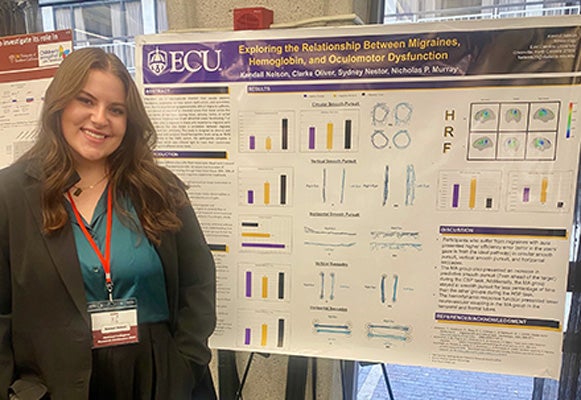Student presents migraine research at Harvard University
The itinerary for East Carolina University student Kendall Nelson was finalized a few days before she traveled to present at the National Collegiate Research Conference in late January. It was during that time when the environment Nelson was about to enter fully resonated with her.
“I had to go up to my teachers to tell them I was going to Harvard and wasn’t going to be in class that Thursday,” said Nelson, a senior majoring in exercise physiology in the Department of Kinesiology in the College of Health and Human Performance. “I think that is when I was like, ‘Wow, I’m getting on a flight in the morning to go to Harvard University to present research.’ Then it really kicked in.”
Nelson’s trip was supported by the Office of Undergraduate Research, the Department of Kinesiology and the Students’ Treasure Chest. Her mentor is Dr. Nick Murray, director of the ECU visual motor lab. Nelson began working in the lab during her sophomore year and focused recently on the long-term effects of migraines.

East Carolina University senior Kendall Nelson stands with her poster during a session at the National Collegiate Research Conference at Harvard University. (Contributed photos)
Her project is titled “Exploring the Relationship Between Migraines, Blood Flow, and Oculomotor Dysfunction.” Research outcomes were influenced by the presence of migraines with visual aura.
“The way I explain my project is it’s looking at if migraines cause permanent neurological damage,” said Nelson, who has personal experience with migraines and that played a role in her research interest. “So if you’ve had migraines for a long time, is that, No. 1, causing your eyes to be less coordinated? Also, is it causing the blood flow in your brain to not work as well? What we found is if you experience migraines with visual aura, which is the spots that go over your vision, then you are deficient in four out of the five ocular motor controls for basic movements of the eye, and if you have migraines with visual aura, you have decreased blood flow in your frontal and temporal regions of your brain. … We tested another group with regular migraines without that aura, and there was a difference between those. It does seem to be the aura that is making the difference.”
The three-day event at Harvard is the nation’s largest student-run research conference. It featured workshops, presentations and keynote speakers.
Nelson said she met new friends from New York and elsewhere. Visiting the Harvard Museum of Natural History is a memory that stuck with her, as part of a conference unlike any other she has experienced.
“I’m just grateful they were able to put me there,” she said. “Being on my own at Harvard and making connections was great, and one other interesting thing was I was able to learn outside of my realm. Learning about history, humanities, political science, it was really interesting because everyone there was so deep into their academics. We all wanted to have scholarly conversations about any kind of topic.
“I visited the Harvard Museum of Natural History, which takes around three hours to get through and has everything about natural history you could think of, and is not something I really ever touch on. All the other conferences I’ve been to were so specific to what I do, so it was interesting to listen to how much people care about other topics.”
The Office of Undergraduate Research, under ECU Research, Economic Development and Engagement, is committed to promoting and supporting student excellence by providing funds through conference awards. Awards help defray the costs of travel to present at research and creative activity venues.
“I am thrilled that Kendall was able to attend the National Collegiate Research Conference at Harvard University, an event that elevates undergraduate research on a global level,” said Dr. Tuan Tran, director of the Office of Undergraduate Research. “It is the desire, passion and ambition of undergraduate students at ECU that epitomizes scholarly excellence. I am delighted that the Office of Undergraduate Research was able to facilitate Kendall’s participation at a world-renowned institution with a conference award, and look forward to assisting ECU students in achieving their goals.”
Nelson is set to graduate this spring and has been accepted into the cognitive and neural sciences psychology doctoral program at the University of South Carolina. She is an American Kinesiology Association national scholar and an ECU Beacon Scholar.
“I tell people that I got very lucky with the teachers I’ve had at ECU,” Nelson said. “I had a class with Patrick Rider, who told us that if we wanted to go to grad school, then we needed to get involved with research. I joined the visual motor lab, and Dr. Murray is amazing. He has given me opportunity after opportunity. It’s allowed me to go straight to a Ph.D. program next year, just because I have so much research experience.”
Nelson’s research interests led her to the visual motor lab and eventually an unforgettable experience at Harvard. Having benefited from mentorship at ECU, Nelson can now offer perspective about taking advantage of opportunities.
“I would tell students who are coming in to get involved in research because it opens up so many doors,” she said. “Research opens up so many different and interesting pockets of academics that you don’t know are there until you do it.”